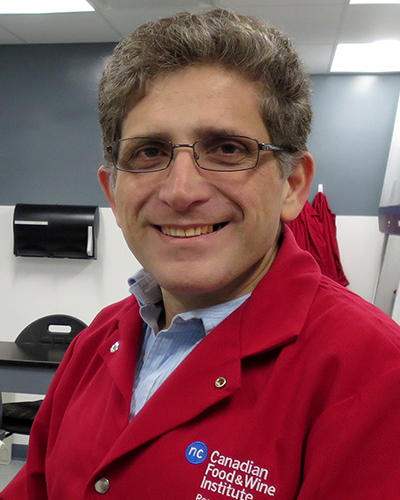A better life in Canada for his family and a chance to further his own education put Jose Gabrie on a path to Niagara College several years ago.
The new research lab technologist with the Canadian Food and Wine Institute (CFWI) Research Centre has a background in microbiology and chemistry, as well as many years working with food safety protocols in Central American countries, including his native Honduras.
He came to Canada in 2009 to pursue his master’s degree in health biosciences, working on research involving parasitology – the study of parasites, their hosts and the relationship between them.
Gabrie fills a much-needed role with the recently opened CFWI Research Centre, as equipment is being added to the new labs and best practices implemented for food and beverage research projects involving students, faculty and industry partners. The CFWI Research Centre is operated by Niagara Research, the college’s Research and Innovation division.
“I have a background as a microbiologist, but early on I had an interest in working in the food industry,” Gabrie notes.
While still in Honduras, he developed health and food safety programs for banana plantations for Chiquita Brands International, and for U.S.-based Fintrac Inc., a consultancy company that develops agricultural solutions to end hunger and poverty.
As a consultant, he worked with both the Honduran and the Panamanian governments to develop food safety guidelines and implement certification protocols in fruit and vegetables growers, packers and processors exporting to North America and Europe.
But along with this early work and success for the father of four young children came the desire for a better life for him and his family.
“I really wanted to expose her to a culture and place that allows her to develop herself,” he says of his oldest child, Maria, 19, who lives with Spine Bifida. “I didn’t want her to be treated like a handicapped person, which is what happens a lot in developing countries. They are treated poorly and are often relegated to a corner.”
Gabrie and his wife also enjoy a better sense of safety in Canada, for themselves and for their children, now ages 14 to 19.
“They love it here and are definitely acclimated. I always tell them nowhere is perfect, but Canada has so much to offer, with a great blend of cultures.”
Visiting Honduras recently, Gabrie couldn’t help but feel the residents there are relegated to personal “prisons,” fearing for their safety in gated homes with barbed wire at the top of the fences.
Having settled in Niagara Falls, his biggest challenge in the past few years has been to find enough hours in the week to complete the goals he has set for himself. Not long after coming to Canada and starting his master’s at Brock, Gabrie was offered a contract teaching position at Niagara College, filling in for courses in microbiology- toxicology, and analytical chemistry in the environmental and horticultural programs.
“I really enjoyed teaching, and I learned while I was here that the college has a lot to offer.”
Since graduating from Brock in 2013, he has been assisting his supervisor with research projects and teaching duties, and preparing to pursue a PhD, also in parasitology.
This winter, with construction complete and some of the equipment in place at the CFWI Research Centre, Niagara Research was ready to hire a research lab technician to make the centre fully operational. Gabrie’s experience in agriculture and food safety, combined with his background in microbiology and chemistry, have given him the ability to quickly identify gaps and order the necessary equipment to provide even more resources and capabilities in the centre.
He says his job is about 30% administration; 15% teaching, since there are students involved in the research projects; and the rest of the time is lab work pertaining to research activities.
To learn more about the CFWI Research Centre, visit NiagaraCollege.ca/Research.






